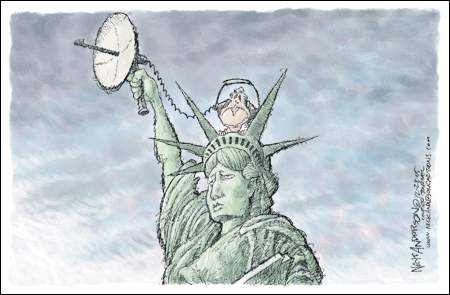|
December 27, 2005
A review by Ladelle McWhorter of a book on Foucault and freedom by Johanna Oksala (Cambridge University Press, 2005). It was noted by Ali Rizvi over at Foucault Reflections without comment.

Nick Anderson
It sounds interesting as McWhorter observes that Oksala rightly argues that Foucault's radical rethinking of both bodies and freedom largely escapes the simplistic criticisms routinely put forward against the Foucault (of Discipline and Punish) in the early 1980. McWhorter says that Oksala also reads Foucault against the background of three major continental philosophers: Edmund Husserl, Maurice Merleau-Ponty and Emmanuel Levinas. That kind of reading is generally not done with Foucault.
Discipline and Punish was about societies and states in the nineteenth century that used a mode of power which worked through the calculated distribution of bodies, spaces, time, and gazes in order to fabricate subjects who were compliant and useful. Hence the emphasis on prisons, schools, hospitals asylums, workhouses and on reforming the delinquent, the criminal, the unemployed, and the mad. Discipline is about shaping the conduct of subjects for certain ends--eg., to reform, educate, exploit or to cure them-- not to produce slaves or automatins.
This disciplinary kind of society and control of conduct broke down, or disintegrated, in the late 20th century with the shift to neo-liberalism the deregulated market, new technological networks and the rise of the entrepreneurial society.
So how is political freedom linked to Oksala's interpretation of Foucault?
McWhorter says that:
Oksala argues that Foucault's genealogies are not merely histories of how bodies have been variously perceived -- as machines, as organisms, etc.....For Foucault, the body is thoroughly historical... For him, subjectivity is not an entity apart from power and constituted by it; in a very important sense it is power. In Foucault's work, "the subject and the constitutive matrix are not understood as external to each other, but are rather regarded as importantly continuous and entangled in complex ways through the idea of a constitutive apparatus" ....The only way to see the subject (and hence the body) as powerless and unfree is to see it as divorced from power and unable to partake of power in any way. And that is decidedly not Foucault's view.
The social world is a dynamic power/knowledge network, and how body-subjectivities are constituted varies with that dynamic and the interests and intentions exercised within and through the technologies deployed by the network of control practices.
McWhorter adds that Oksala argues that this power/knowledge network does not eliminate freedom:
Power relations must repeat in order to maintain themselves; body-subjects are called upon to reiterate social norms as part of their continual constitution. But whenever reiteration occurs, there is always the possibility of difference. The body-subject's constitution is never wholly complete. Freedom, then, is not a characteristic or quality of a subject but is the subject's inherent opening toward newness.
Foucault's conception of bodies and pleasures, which provides a possibility of a counterattack (resistance?) against normalizing power presupposes an experiential understanding of the body. The experiential body can become a locus of resistance because it is the possibility of an unpredictable event.
Is freedom as an 'opening toward newness' within a network of power relations a political conception of freedom? If so, how is the experiential body and the possibility of an unpredictable event connected to citizenship, the exclusion of some bodies from the liberal polity, the vast interlocking networks of biopower, or the shift away from the welfare state?
Does not the Howard Government take the reconstruction fo the welfare recipient as a central problem: to shift them from welfare dependency to work activity; to reform habits as a condition of the receipt of benefits, to use the welfare to work reform to encourage self-reliance?
|
